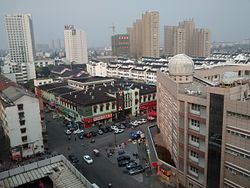Jiangyan
|
Jiangyan 姜堰区 |
|
|---|---|
| District | |
 |
|
| Location in Jiangsu | |
| Coordinates: 32°30′06″N 120°08′09″E / 32.5017°N 120.1358°ECoordinates: 32°30′06″N 120°08′09″E / 32.5017°N 120.1358°E | |
| Country | People's Republic of China |
| Province | Jiangsu |
| Prefecture-level city | Taizhou |
| Area | |
| • Total | 927.53 km2 (358.12 sq mi) |
| Population (2010) | |
| • Total | 728,645 |
| • Density | 790/km2 (2,000/sq mi) |
| Time zone | China Standard (UTC+8) |
| Postal code | 2255XX |
Jiangyan District (simplified Chinese: 姜堰区; traditional Chinese: 姜堰區; pinyin: Jiāngyàn Qū) is one of three urban districts of the city of Taizhou, Jiangsu province, China, having been, until December 2012, a county-level city. Jiangyan is noted for being the birthplace of the former General Secretary of the Communist Party of China Hu Jintao.
Formerly called Taixian or Taihsien (Traditional Chinese: 泰縣, Simplified Chinese: 泰县, pinyin: tāixīan), Jiangyan was a county by the end of the Western Han Dynasty. It has relics from the Zhou Dynasty and a Buddha statue from the Tang Dynasty. It was a town in the Qing Dynasty
Jiangyan has previously also been called Hailu (Chinese: 海陆), Wuling (Chinese: 吴陵), and Taizhou (Chinese: 泰州). In July 1994, the name was changed to Jiangyan and city status obtained.
The Qintong Boat Festival (Chinese: 溱潼会船) has a long history going back to the Ming Dynasty, and is growing in importance as a tourist destination in eastern China.
The Baima Temple (Chinese: 白马庙, meaning white horse temple) in Jiangyan (now in Taizhou) is the birthplace of the Navy of the People's Liberation Army.
...
Wikipedia

